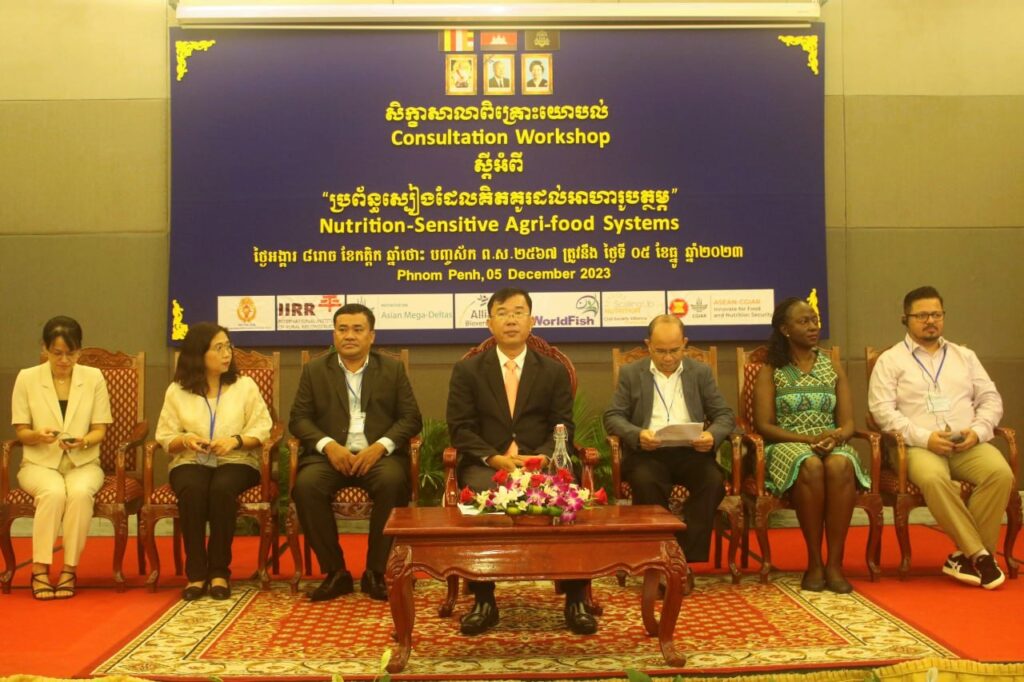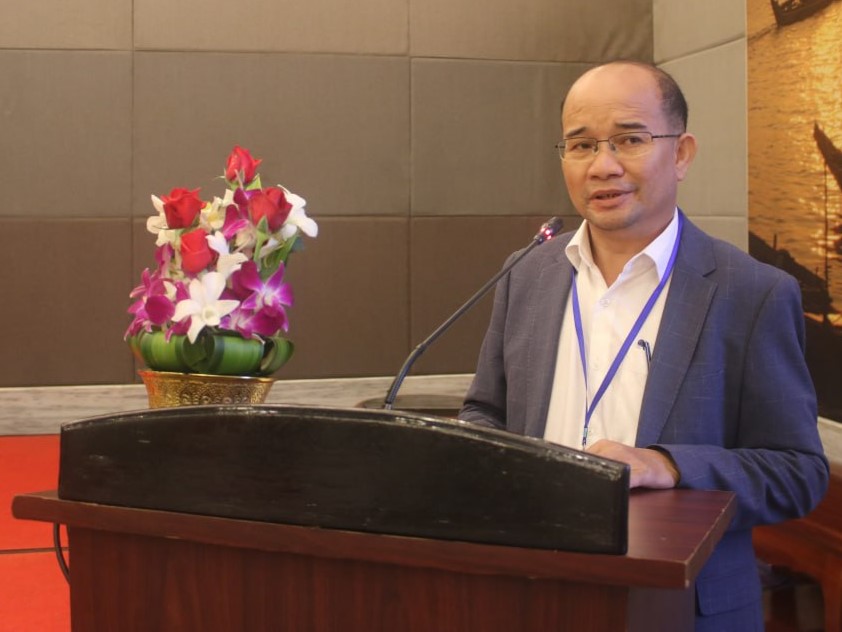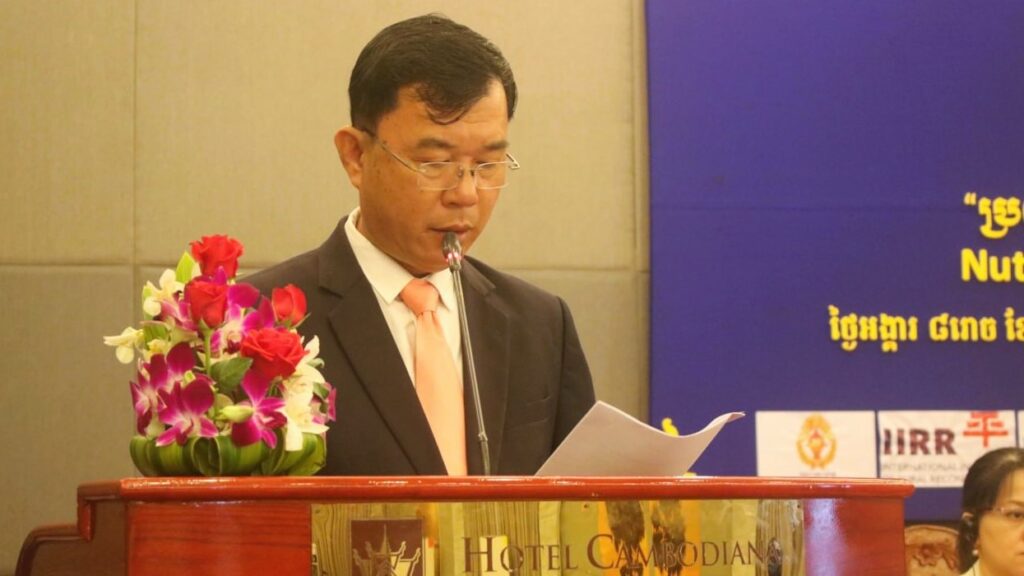On December 05, 2023, IIRR-Cambodia collaborated with the Council for Agricultural and Rural Development (CARD) and the Alliance of Bioversity and CIAT to organize a consultation workshop on nutrition-sensitive agri-food systems along the deltaic regions. This workshop allowed actors within food systems to exchange information on ongoing and upcoming activities and exchange ideas on the topic of nutrition-sensitive agri-food systems in the Mekong Delta of Cambodia. The workshop aimed to present the results of research findings from the scoping study and case studies on nutrition-sensitive agri-food systems of the AMD Work Package 2 (AMDWP2), exchange information on ongoing and upcoming activities related to nutrition-sensitive agri-food systems in the Mekong Delta, and derive lessons, best practices, and policy implications on designing and implementing Delta nutrition sensitive agri-food systems.

The workshop’s 90 participants included stakeholders from various government bodies such as the Council of Agricultural and Rural Development (CARD), General Directorate of Agriculture (GDA), Ministry of Industry, Science, Technology and Innovation (MISTI), Ministry of Women Affairs (MOWA), Ministry of Social Affairs, Veterans and Youth Rehabilitation (MOSVY), Royal University of Agriculture (RUA), and representatives from development partners (World Bank, World Food Programme), non-governmental organizations, community-based organizations, research institutions, farmers, and the private sector.
In opening the workshop, IIRR-Cambodia Director, Mr. Or Thy, highlighted why this project is significant for the country. He noted that the production of agri-food systems in Cambodia requires a high capital investment, but the profit received from it is low, or in some cases, there is even a loss of profit. Thus, this consultation workshop brought together stakeholders and producers to consider what has been implemented in the past and what can be done to ensure that there will be a sustainability of production, a variety of crops, fish and animals, and a building of climate resilience to provide food security and nutrition starting from the farm to the table, for sustainable production and consumption.

H.E. Kao Muythong, Deputy Secretary General of CARD, emphasized that nutrition has been a crucial issue that has been discussed for centuries worldwide. He noted that although CARD has supported nutrition-sensitive agri-food systems, addressing the nutrition issue will require cooperation and further innovations and implementations among relevant stakeholders and partners to strengthen laws and regulations on food security and nutrition.

Dr. Deborah Nabuuma, from the Alliance of Bioversity and CIAT, introduced a project overview of AMDWP2, covering its target, importance, challenges and activities covered in both 2022 and 2023. Mr. Chuon Sophea, from IIRR-Cambodia, presented the findings of the Scoping Study on Existing Nutrition-Sensitive Agri-Food System Interventions in the Mekong Delta, Cambodia. The scoping study covered activities targeting food systems, projects implemented and interventions related to nutrition-sensitive agri-food systems, including their relevant issues, accomplishments and challenges.
Ms. Elizabeth Ignowski from WorldFish presented findings on Changes in Food Consumption and Food Habits in the Mekong Delta. The presentation illustrated in detail household food consumption and share of food in total household expenditure, as well as the types of food consumed by each household in rural areas of the Mekong Delta provinces. This data, in turn, denoted how food secure the families are according to their expenditure, access to food and types of food consumed.
Mr. Say Tom, Deputy Director of the Department of Horticulture and Subsidiary Crop, presented an Overview of the Agriculture Service Programme for an Inclusive Rural Economy and Agricultural Trade (ASPIRE-AT). The International Fund for Agricultural Development (IFAD) supports the project, which targets 17 provinces in Cambodia and is now planning to expand to 4 other provinces, namely Kampong Speu, Kampot, Kampong Chnang and Pursat. This project’s beneficiaries are smallholder farmers and landless or land-poor householders to strengthen market access and public-private partnerships surrounding exports and agri-food production in Cambodia.
After these valuable presentations, a fruitful plenary discussion was arranged. Participants were divided into six groups where they discussed what was missing in implementing nutrition-sensitive agri-food systems and the good practices and lessons learned with the inclusion of gender aspects in the Mekong.
The final session introduced Intervention Package 8 on Food Systems Transformation for More Nutritious Healthy Diets (IP8), presented by Dr. Ricardo Hernandez from the Alliance of Bioversity and CIAT. This IP8 seeks to identify indicators that will better identify the data and processes of the food systems at the country and regional levels, which will explain and measure changes and identify interventions and investments to improve the performance of food systems.
To conclude the workshop, H.E. Kao Muythong and IIRR-Cambodia Director Mr. Or Thy summarized the Way Forward and closing remarks of AMDWP2, highlighting collaboration with World Fish, The Alliance of Bioversity and CIAT, CARD, SUNCSA, and sub-national partners, NGOs, CSOs and the provincial level to further improve nutrition-sensitive agri-food systems. Furthermore, workshop organizers aim to gather inputs into a workshop report and gather these to draft into Cambodia’s national policy and action plan. Lastly, H.E. Kao Muythong highlighted that behavior change among Cambodian people regarding how food needs to be consumed is key: ensuring production alone does not guarantee adequate food safety and nutrition for each individual and household.



